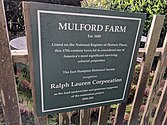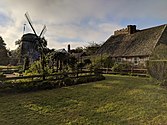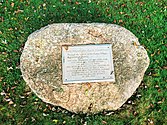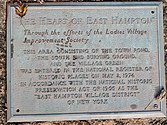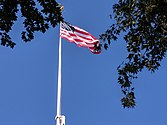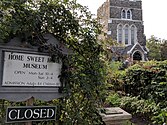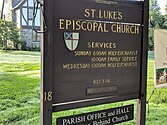East Hampton Village District
East Hampton Village District | |
 "Home Sweet Home" | |
| Location | Bounded by Main St. and James and Woods Lanes, (original) Northeastward along Main St. to Newton La. and Southwestward along Ocean and Lee Aves. and Pond La. to Hedges La., (increase), East Hampton, New York |
|---|---|
| Coordinates | 40°57′17″N 72°11′28″W / 40.95472°N 72.19111°W |
| Architect | J.C. Thorp |
| Architectural style | Late 19th And 20th Century Revivals, Bungalow/Craftsman, Late Victorian |
| MPS | Village of East Hampton MRA |
| NRHP reference No. | 74001309 (original) 88001032 (increase)[1] |
| Added to NRHP | May 2, 1974 (original) July 21, 1988 (increase)[1] |
East Hampton Village District is a historic district in East Hampton, New York.[2][3]
It was listed on the National Register of Historic Places in 1974. Its boundaries were increased in 1988.[1]
Contributing properties include what is known as the John Howard Payne House (a.k.a.; "Home Sweet Home") and the Thomas Moran House, a National Historic Landmark.
The Pantigo Windmill and the Gardiner mill, two of the east end's New England–style smock windmills, are also included.
Next to the 1926 flagpole on the village green is a large rock with a plaque installed on it, marking the historic district. The Green slopes up to the South End Cemetery, which was the site of the historic Town Church. It was a thatched roofed structure that was demolished. Near its former site is a memorial to Lion Gardiner, whose grave is 30 feet away. Historical markers about the Rev. Thomas James, first church minister are located on both James Lane and Pondview Lane. Further along is the town pond. This oval constitutes the original boundaries of the historic district.
It was expanded to include, on the other side of James Lane, Tuthill House, Mulford Farmhouse, Home Sweet Home (associated with writer John Howard Payne), St. Luke's Episcopal Church and Rectory, the replica of the John Lyon Gardiner Mill Cottage, Gardiner Mill, The Rev. Thomas James historical marker- first pastor of the town church, (1651-1698) and the Thomas Moran House. The trees on side of the street by Mulford homestead are all separately marked with a stone with a name/date shield.[4][5][6][7][8]
-
Mulford Farm in East Hampton
-
English colonial farmsteads; the Pantigo Windmill abuts the farm.
-
Mulford Farm colonial farmsteads.
-
Farm in East Hampton, Long Island
-
Pantigo Windmill
-
NRHP contributing structures and markers on the green
-
Seats outside Mulford Farm
-
The street was lined with memorial markers and contemplation benches.
-
Mulford Farm is within the Village District
-
Mulford Farm privy is in center/left
-
Home Sweet Home Museum
-
NRHP contributing structures on the green
-
Pantigo Mill and St Lukes church
-
Gardiner Mill
-
Gardiner mill and replica saltbox house
-
Replica of John Lyon Gardiner Cottage
-
Rear view
-
NRHP contributing structures and markers on the green
-
South End Cemetery
-
Rev Thomas James, noted as first pastor
-
Gardiner Mill, 1804
-
Town Church HM
-
NRHP St. Lukes Rectory
-
Contributing structures and markers on the green, tree marker
-
“This Flag Pole dedicated to the Village of East Hampton in memory of George Lodowick McAlpin, 1856-1922, by members of his family, July 4, 1926.” — Plaque.
-
St. Lukes Episcopal - Entrance hall and bell tower
-
The foreground sign is at the entrance to the Home Sweet Home museum; the building in background is St. Luke's Church
-
Services billboard
-
Residence and studio of artist Thomas Moran; operated as house museum
-
Clinton Academy - c.1784 First academy chartered in New York state
-
Town Pond from the west
-
Town school house, inside view
-
Town school house, rear view
-
Contributing property, desk with quill 02
References
[edit]- ^ a b c "National Register Information System". National Register of Historic Places. National Park Service. April 15, 2008.
- ^ Lynn Beebe Weaver (November 1973). "National Register of Historic Places Registration: East Hampton Village District". New York State Office of Parks, Recreation and Historic Preservation. Retrieved September 29, 2011.
- ^ Mark Peckham (August 1987). "National Register of Historic Places Registration: East Hampton Village District (Boundary Increase)". New York State Office of Parks, Recreation and Historic Preservation. Archived from the original on October 10, 2012. Retrieved September 29, 2011. See also: "Accompanying 108 photos".
- ^ "Gardiner Mill, 1804, East Hampton .................................. UPDATED 9.24.2021". Art & Architecture Quarterly. July 6, 2013.
- ^ "Archived copy". Archived from the original on April 22, 2021. Retrieved September 30, 2018.
{{cite web}}: CS1 maint: archived copy as title (link) - ^ "Archived copy". Archived from the original on September 29, 2018. Retrieved September 30, 2018.
{{cite web}}: CS1 maint: archived copy as title (link) - ^ "East Hampton Main Street Historic District/ East". Art & Architecture Quarterly. May 10, 2013.
- ^ "The Mill House Inn Tour of Historic East Hampton". Mill House Inn. June 6, 2018.
External links
[edit]![]() Media related to East Hampton Village District at Wikimedia Commons
Media related to East Hampton Village District at Wikimedia Commons



